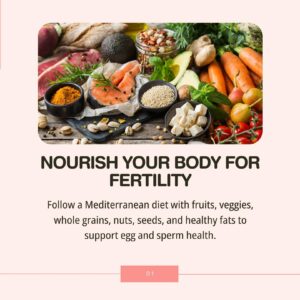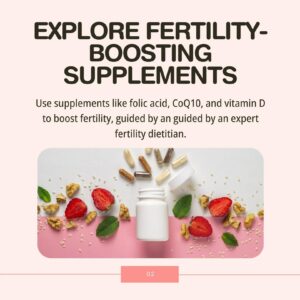Five Tips to Enhance Fertility When Trying To Conceive
Are you and your partner trying to conceive but finding it more challenging than expected? You’re not alone. Many couples face fertility struggles, which can feel overwhelming, but the good news is that there are proven ways to enhance your chances of conception. Thanks to modern research, we now have more profound insights into natural strategies that can help optimise fertility and pave the way for your journey to parenthood.
In this guide, we’ll explore five evidence-based tips designed to empower you with the tools and knowledge you need to navigate this journey successfully.
Tip 1: Nourish Your Body for Fertility
When trying to conceive, your diet can be pivotal in enhancing fertility. A Mediterranean-style diet, rich in fruits, vegetables, whole grains, nuts, seeds, and healthy fats, has been shown to support reproductive health and improve fertility outcomes. This nutrient-dense diet fosters a healthy environment for egg and sperm quality, hormonal balance, and embryo development.
Key nutrients in the Mediterranean diet boost fertility naturally:
- Omega-3 Fatty Acids: Found in fatty fish, omega-3s enhance embryo implantation and IVF success rates while improving sperm quality and reducing oxidative damage (Ferramosca & Zara, 2022).
- Antioxidants: Foods like berries and nuts combat oxidative stress, which can negatively impact egg and sperm health and improve ART outcomes (Cristodoro et al., 2024).
A Mediterranean-style diet offers a powerful, natural strategy for couples looking to optimise their fertility journey.

Tip 2: Explore Fertility-Boosting Supplements
Fertility-focused supplements can be a valuable addition to your conception plan. However, always consult a healthcare professional before starting new supplements to ensure they fit your needs.
Top Fertility-Enhancing Supplements:
- Folic Acid: Essential for DNA synthesis, folate supports egg and sperm quality. Research links higher preconception folate intake (≥400 µg/day) with increased fecundability. (Cueto et al., 2022).
- Coenzyme Q10 (CoQ10): Improves mitochondrial function, boosting egg and embryo quality for enhanced fertility (Khamadyanova et al., 2024).
- Vitamin D: Restores serum vitamin D levels, especially in women with PCOS, improving embryo quality and significantly increasing clinical pregnancy rates during IVF or ICSI (Zhao et al., 2019).
Guidance from a fertility dietitian through our fertility nutrition assessment and tailored supplement plan can significantly enhance your chances of conception.

Tip 3: Master the Art of Ovulation Tracking
Understanding your ovulation cycle is critical for timing intimacy and optimising conception. Wearable reproductive health technologies are emerging as an effective tool for tracking fertility.
These devices, worn on the wrist, finger, intravaginally, or in the ear, measure physiological changes like heart rate, temperature, and respiratory rate to identify fertile windows, ovulation, and menstruation. They demonstrate high accuracy, making them a reliable option for fertility monitoring (Lyzwinski et al., 2024).
Incorporating wearable technology with a thorough understanding of your menstrual cycle can empower you to maximise your fertility potential.

Tip 4: Manage Stress to Boost Fertility
Stress is often underestimated in its impact on fertility. Chronic stress can disrupt ovulation, affect menstrual cycles, and lower sperm quality. Adopting stress-reduction techniques can restore hormonal balance and improve reproductive outcomes.
- Mindfulness and Meditation: Practices like mindfulness-based stress reduction (MBSR) lower anxiety and support fertility (Kundarti et al., 2023).
- Yoga: Regular yoga practice reduces cortisol levels and improves emotional well-being, positively affecting reproductive health (Koncz et al., 2023).
Incorporating these stress-management techniques into your routine can physically and emotionally support your fertility journey.

Tip 5: Eliminate Harmful Substances
Lifestyle choices and environmental exposures can significantly affect fertility. Reducing harmful substances and creating a cleaner, more fertility-friendly environment can improve reproductive outcomes.
Key Substances to Avoid:
- Smoking: Accelerates the depletion of ovarian reserves, damages egg DNA, and increases miscarriage risk (Dhage et al., 2024).
- Alcohol: Even moderate consumption disrupts hormonal balance and impairs ovulation (Anwar et al., 2021).
- Endocrine Disruptors: BPA, found in many plastics, interferes with reproductive organ function and hormonal balance, impacting ovulation and embryo implantation (Chaichian et al., 2024).

Bottom Line
- Fertility struggles can feel overwhelming, but with the right strategies, you can take control of your journey.
- From nourishing your body with a Mediterranean diet to using advanced ovulation tracking and stress-reduction techniques, each step brings you closer to achieving your dream of parenthood.
